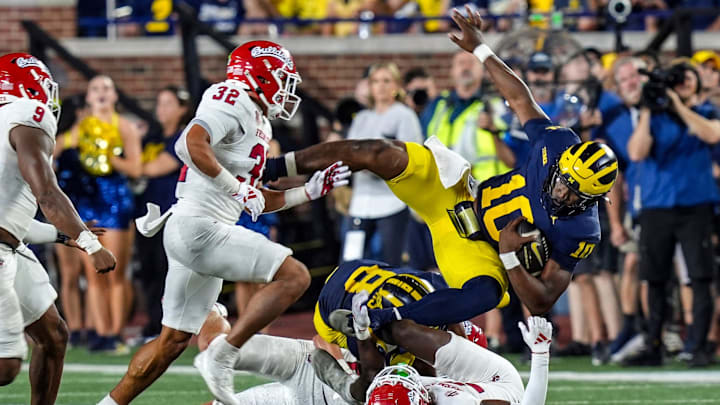Sherrone Moore announced on Monday what many Michigan Football fans have been waiting on for a while. Alex Orji is officially the new starting quarterback of the Wolverines ahead of their matchup with USC.
The decision comes with Michigan football struggling to live up to the high expectations created over the past three seasons in Ann Arbor. This year, they've struggled to consistently move the ball and avoid turnovers on offense, defensively they've missed assignments and are lacking depth, and overall there is a clear lack of discipline and resilience which has been the trademark of the success the Wolverines have enjoyed recently.
So what will this move actually change for Michigan football and is this the answer that they need to get back into the playoff discussion this season?
Doubling Down on the Run Game
The identity of Michigan's offense is centered around running the ball to set up play action passes down the field. While effective, this requires consistency out of the entire offense for it to work. You have to be able to get 3 to 4 yards per run every single time you hand it off in order to keep gaining first downs. When your opponent finally overcommits to stopping the run you throw it over top of them with the play action pass for big gains.
So far this season, the offense hasn't shown the consistency they need to have in order to find success. Teams have been able to overcommit to stopping the run on early downs putting Michigan in far too many third and long situations which are hard to convert (although you wouldn't know it by watching Michigan's own defense).
When Michigan football does try to throw to capitalize on teams overcommitting to stopping the run they've simply turned the ball over too much and are struggling to find enough consistency. On top of that, your best pass catching weapon in Colston Loveland just went down and it's uncertain how long he will be out. With the one bright spot of the passing game now more uncertain than ever and the run game coming off a 300 rushing yard performance Michigan is going to give mobile quarterback Alex Orji the reins to the offense.
The move to Alex Orji should open up the run game even more. This is because on any run play the defense now has to respect the threat of Orji keeping the ball and running with it. This essentially neutralizes the defense assigning an extra player to stopping the run and forces defenses to take pretty extreme measures in order to actually stop the run.
What this will look like schematically is that I expect Michigan to utilize a lot more shotgun and pistol formations to add quarterback read tags (giving Orji the option to keep the ball and run) on almost all of their base run plays. I'd also look for Michigan to utilize more spread formations, forcing the defense to declare coverage pre-snap and moving even more guys away from the line of scrimmage defensively. Together this will put more stress on opposing defenses and hopefully lead to more consistent gains running the ball for Michigan football.
A lot has been made about Orji's 'lack of passing ability'. It's tough to speculate on because we haven't seen him attempt many throws, we've never really seen him get into the rhythm of a game, and the coaches (as they should) swear he is a great passer. Personally I expect him to be fine, but not very polished. Luckily there are ways to still have success and make it easier on him as he grows at the position.
Look for Michigan to utilize more short passes with simple reads. Things like smash concepts to the boundary, drive concepts, and even bubble RPOs. Essentially anything where Orji only has to read one defender and then make a shorter throw or run with it. This will make life easier for Orji throwing the ball and cover up some of his lack of experience as a passer. As long as Michigan mixes in a few deep passes over the course of the game, even if they're incomplete, just to force the defense to respect the threat of it, this should be enough in the passing game to stay balanced, force the defense to cover the entire field, and compliment the running game just enough.
